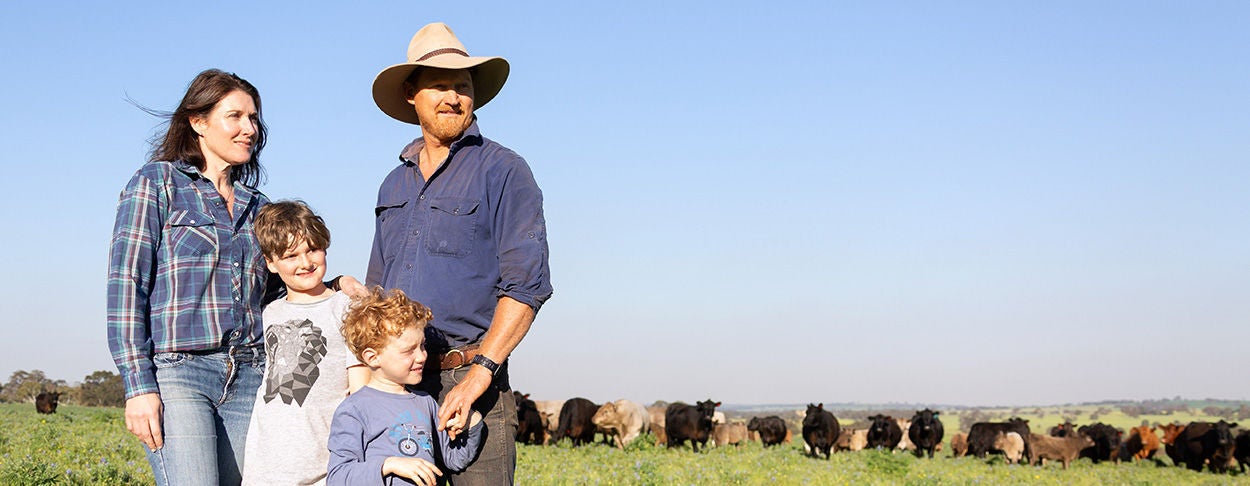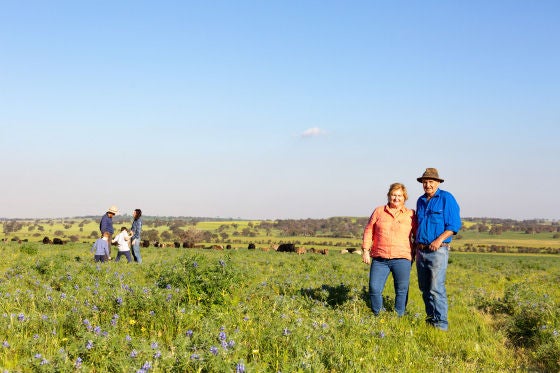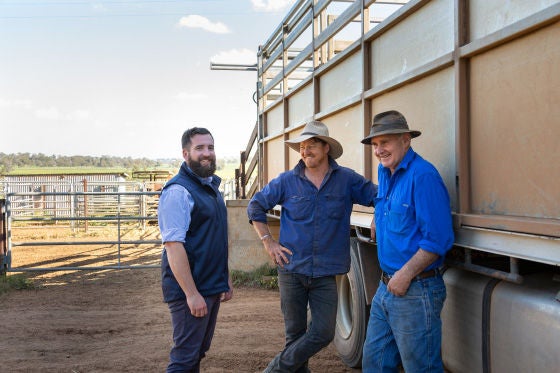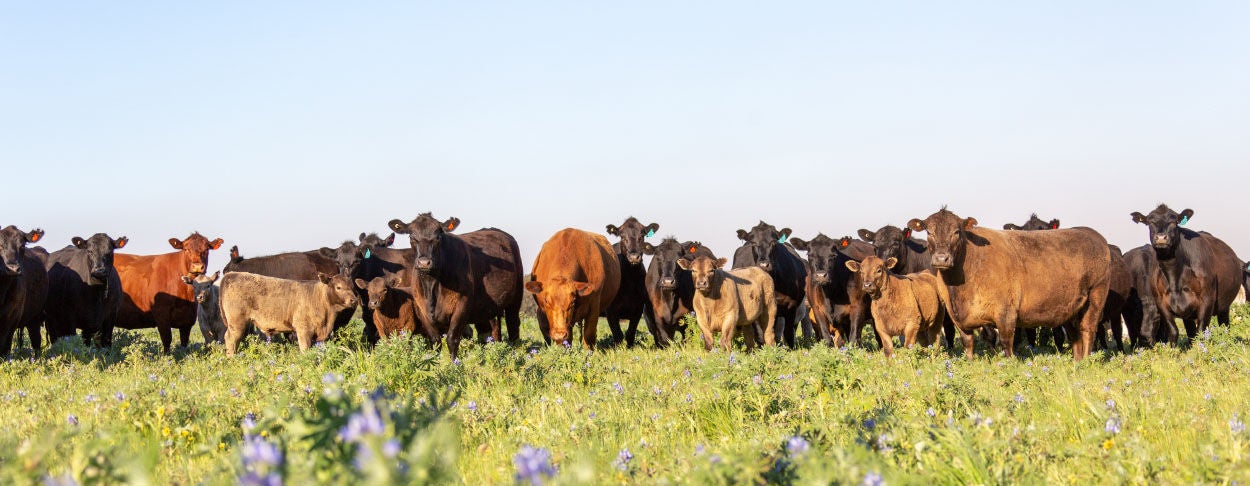Posted by on
11/08/2019
For over 100 years the Cook family has farmed their property Noondel, 200km north of Perth in the Dandaragan region. It is a proud history and one that David and Joan Cook sought to protect when making significant changes to ensure their farm had the potential to support their family for another century.
Since taking on the family farm in 1974, David and Joan Cook had been farming conventionally across a composite of enterprises including cattle, wool, fat lambs and cropping. Toward the late 1990s they had begun to question their traditional farming practices and eventually made the bold decision to become one of the early adopters of organic production in 2000.
Their daughter Tracey, who joined the operation with her husband Richard Cooper and their two young boys in 2011, said as early adopters, moving to organic production had been a steep learning curve for her parents.
"When my parents started to consider the possibility of farming free of chemicals there was no handbook available to becoming organic on a larger scale."
“They invested time and money into education attending various courses, researching, and asking questions,” Tracey added.
“Completing the Holistic Management Course with the late Bruce Ward was instrumental in giving them the tools to make the leap, particularly using cell grazing to control worms, better manage pasture and improve soil fertility with organically approved inputs.”
Overcoming the hurdles to produce organic beef in a sustainable manner was only one aspect of the challenges faced by the Cook family, the other was developing a market from scratch.
“When their first certified organic cattle were ready for sale they could only find two butchers who were prepared to try the beef,” Tracey said.
“So, for a few years excess beef was packed and frozen into family packs, which was loaded into a freezer trailer and delivered around Perth.

“That’s how Dandaragan Organic Beef came to the attention of the WA butcher sector, fortunately we now have a significant butcher customer base across the state, and a bit interstate as well, which sells Dandaragan Organic Beef to consumers, health food outlets, restaurants and farmers’ markets.”
Consumers can also now buy their organic beef direct from Dandaragan Organic Beef’s online shop.
“Last year we launched online sales of organic, grass-fed beef boxes which are home delivered all over Western Australia,” Tracey said.
“This is due to consumers’ desire to have a closer connection to where their food is coming from.
“There is a growing understanding among consumers about regenerative agriculture and how soil health is linked to human health.”
Over the past 20 years the Cooks have continued to work on their pasture, cattle breeding and management techniques to develop an organic product that is sustainable, consistent, and delicious.
The operation currently runs around 1800 head of Angus and Square Meater cross cattle and are continuing to evolve their practices and breed to meet market demands.
“We’ve headed in this direction due to customer demand,” Tracey said.
“The butchers just love this cross because they are compact and have a very high meat yield.”
Relaxed cattle and happy customers
Tracey said the beef cattle they use to supply the Dandaragan Organic Beef market experience very little stress in their lifetime.
“We have adopted a range of low stress handling techniques that we firmly believe add greatly to the lives of our animals and is reflected in the flavour and tenderness of our meat,” she said.
“We start with low stress weaning methods, leaving our calves with their mums for a minimum of nine months and work with them regularly in the yards to ensure they are comfortable with humans.
“Handling our weaners in this way has ensured they maintain their weaning weight but it also sets them up to be much calmer as fully-grown animals.”

These low stress stock handling techniques carry right through the operation where they’ve axed the humble cattle prod in favour of more cattle-centric movement techniques.
"Our stock handling methods are based on gentle and subtle techniques of working with natural herding animal instincts."
“Raised voices, sticks or prodders are not allowed, instead we work on placing ourselves at strategic points that will allow the cattle to flow, done correctly you can move a mob of several hundred cattle without the need to tear around on motorbikes or utes,” Tracey explained.
“The outcome of this is that our animals remain calm when they have to be moved or processed in the yards and ultimately produces a better-quality beef product.
“It also removes much of the stress for the human counterparts.”
Working with soil
For the Cooks, the move to organic has in many ways been a move from beef production to pasture production, with nearly 50 per cent of their two farms now planted to perennial pastures to ensure a weekly load of prime grass-fed beef 12 months of the year.
“The first paddock we ploughed up for perennial sowing happened to be along the road into town, there were lots of locals puzzled as to why we would be ploughing up a paddock in the spring,” Tracey said.
“But you need to sow into the warmer soils to ensure germination, the perennial grasses grow in summer, so we can take advantage of moisture from summer storms and it will survive on morning due.
“In the middle of summer when our annual pastures have dried off we still have green paddocks, and our cattle love them.”
Improving the fertility of their soils has been a driving focus for the Cook family and substantial investment through application of lime, dolomite, gypsum, trace elements and composted chicken manure has worked wonders on balancing their soil profile.
“Along with balancing the soils through mineral application we also use holistic techniques such as cell grazing to keep cover on our paddocks and to protect soil microbiology.
“Improving our pastures has also meant that any moisture that comes our way is able to soak straight into the soil and not run off, so there is no longer any water or wind erosion.
Moving to carbon neutral
The Cooks also have a program to plant thousands of trees each year to provide shade for their stock and to contribute to reducing their carbon footprint.
Carbon sequestration trials on the property have proved that their hard work is paying off, showing that organic carbon is being deposited at depth under their perennial pastures and cell grazing paddocks.
With the wants of consumers always in their mind, the Cooks have their sights set next on adding carbon neutral certification to their organic beef certification, which would involve having a carbon audit of their property.
“They look at absolutely everything – how much fuel you’re using, how much electricity, they look at your head of cattle and how much methane they are producing, Then they look at how many trees you’ve planted and how much perennial pasture you’ve put down,” Tracey explained.
“If we can have certification that we are carbon neutral, that would be a big tick for our brand.”
For Dandaragan Organic Beef, their operation is so much more than just producing steak and since joining Rabobank in 1994 Tracey says the bank has never shied away from joining them on this journey.
“The best thing about Rabobank is that it was started by farmers helping farmers, so they have the right ethos of trying to help the agribusiness sector,” she said.
“Being an early adopter of any major change can make many financial institutions nervous, but Rabobank has not only been understanding, but encouraging of everything we’ve wanted to do.”
The Cook’s might have a long history in the Dandaragan region but in many ways they are composing a very different future for the family’s operations.
Grandsons Wes and Oli might currently own the title of “chief gate openers” but the future looks bright, the Cook family is confident that the next generation will be taking on a property with soil healthier than it was a century ago.

